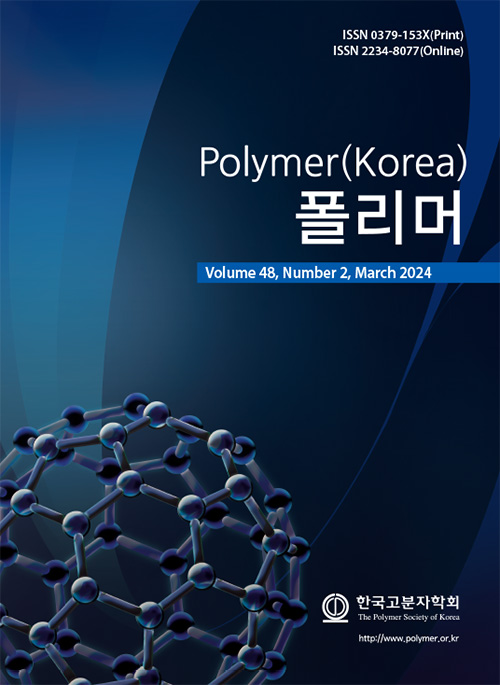- Nanoporous Polypropylene Membranes Prepared by a New Crystallization-based Method
Department of Chemical Engineering and Materials Science, Chung-Ang University, 84 Heukseok-ro, Dongjak-gu, Seoul 06974, Korea
- 새로운 결정화 기반 방법으로 제조된 나노다공성 폴리프로필렌 막
중앙대학교 공과대학 화학신소재공학과
Reproduction, stored in a retrieval system, or transmitted in any form of any part of this publication is permitted only by written permission from the Polymer Society of Korea.
In this study, a simple crystallization process that can manufacture polypropylene films into porous membranes was newly developed; a porous membrane with nano-sized pores was fabricated through solvent penetration into films, melt crystallization and selective extraction of the solvent crystals, and its properties were analyzed. The pore structure of the particles was controlled by adjusting the mixing temperature of polypropylene and solvent. When arachidic acid, a solvent, permeated polypropylene at 160 ℃, a continuous pore structure was observed. The pore size of the manufactured membrane is 300 nm, which is smaller than that of existing polypropylene separators. When analyzing the mechanical properties of the membrane, the modulus, tensile strength, and elongation at break varied depending on the temperature at which the solvent penetrated. This novel simple and efficient manufacturing method can be used in the field of water treatment membranes or battery separators.
본 연구에서는 폴리프로필렌 필름을 다공성 멤브레인으로 제조할 수 있는 간단한 결정화 공정을 새로 개발하였다. 즉, 필름에 결정화 가능한 용매를 침투시키고, 용융 결정화, 용매만의 선택적 추출 단계를 통해 나노 크기의 기공을 갖는 다공성 멤브레인을 제작하고 특성을 분석하였다. 폴리프로필렌과 용매의 혼합 온도를 조절하여 입자의 기공 구조를 제어할 수 있었고, 160 ℃ 온도에서 용매인 arachidic acid를 폴리프로필렌에 침투하였을 때 연속적인 기공 구조가 관찰되었다. 제작된 멤브레인의 기공 크기는 300 nm로 기존의 폴리프로필렌 분리막보다 낮은 기공 크기를 가졌다. 막의 기계적 물성을 분석했을 때 모듈러스와 인장 강도, 파단 연신율은 용매가 침투되는 온도에 따라 조절이 가능하였다. 이 새로운 간단하고 효율적인 제조 공법은 수처리용 막이나 배터리 분리막 분야 등에서 활용이 가능하다.
Keywords: polypropylene, porous membrane, solvent crystallization, ice templating, directional freezing.
- Polymer(Korea) 폴리머
- Frequency : Bimonthly(odd)
ISSN 0379-153X(Print)
ISSN 2234-8077(Online)
Abbr. Polym. Korea - 2023 Impact Factor : 0.4
- Indexed in SCIE
 This Article
This Article
-
2024; 48(2): 211-216
Published online Mar 25, 2024
- 10.7317/pk.2024.48.2.211
- Received on Nov 23, 2023
- Revised on Dec 13, 2023
- Accepted on Dec 14, 2023
 Correspondence to
Correspondence to
- Jonghwi Lee
-
Department of Chemical Engineering and Materials Science, Chung-Ang University, 84 Heukseok-ro, Dongjak-gu, Seoul 06974, Korea
- E-mail: jong@cau.ac.kr









 Copyright(c) The Polymer Society of Korea. All right reserved.
Copyright(c) The Polymer Society of Korea. All right reserved.